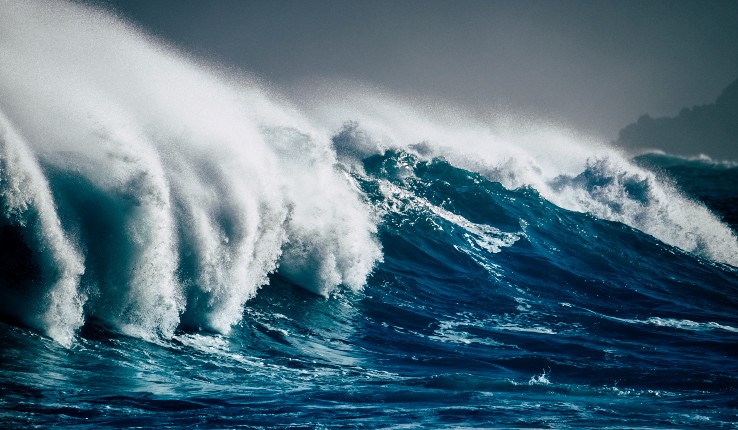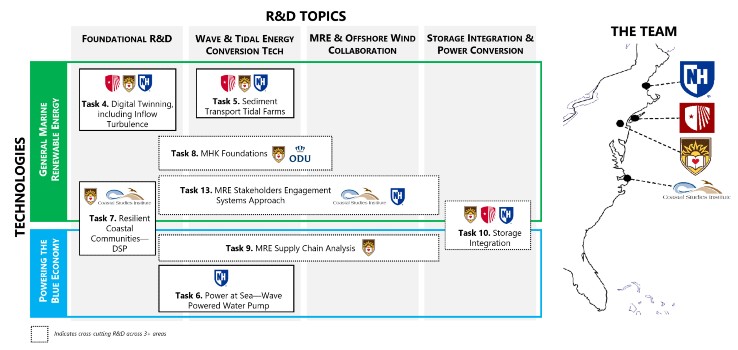Lehigh University will partner with three other East Coast universities to form the new Atlantic Marine Energy Center (AMEC), which has been awarded $9.7 million over four years from the U.S. Department of Energy (DOE). The center will focus on research and development to address ongoing needs for sustainable renewable ocean energy. It will be one of only four National Marine Renewable Energy Centers (NMREC) in the country.
The seven Lehigh faculty members involved in AMEC are all part of Lehigh’s Institute for Cyber Physical Infrastructure and Energy (I-CPIE): Arindam Banerjee, Chair, Department of Mechanical Engineering and Mechanics; Shalinee Kishore, Iacocca Chair Professor of Electrical and Computer Engineering and I-CPIE Associate Director; Lawrence Snyder, Department of Industrial and Systems Engineering and I-DISC (Lehigh’s Institute for Data, Intelligent Systems, and Computation) co-director; and, from the Department of Civil and Environmental Engineering: Richard Sause, Joseph T. Stuart Professor of Structural Engineering, Director of the Advanced Technology for Large Structural Systems Engineering Research Center (ATLSS) and I-CPIE Director; Panos Diplas, Muhannad Suleiman and Paolo Bocchini.
“We are excited to partner in the creation of this regional center of excellence to help power the ‘blue economy’ that seeks to support sustainable growth to the benefit of humankind and the environment,” said Banerjee, who is co-principal investigator and co-director of the new Atlantic Marine Energy Center. “This center will improve all of our institutions’ wave and tidal current energy device testing infrastructure with an eye toward accelerating the development of marine-related solutions to some of the world’s most pressing energy challenges.”
Banerjee’s lab at Lehigh has worked on fundamental issues related to space and scale interactions in tidal flows. At Lehigh, Banerjee has developed the first water tunnel facility in the world that uses active-turbulence generation techniques. He has developed the Tidal Turbulence Test Facility (T3F) that contains an active-grid turbulence generator that can mimic elevated freestream turbulence in tidal energy sites. The facility will be used by the Lehigh team and the AMEC partners to twin the inflow flood and ebb tide conditions from different tidal energy sites.
Two additional marine energy testing infrastructure developments are planned at Lehigh’s ATLSS Center: a tidal turbine blade fatigue test rig spearheaded by Sause and a marine foundation testing rig led by Suleiman
In addition, the group will work on problems related to sediment transport in tidal farms led by Diplas; on marine energy supply chains led by Snyder; on storage integration of marine energy technologies led by Kishore and on developing a decision support system for more resilient coastal communities led by Bocchini.
AMEC is a consortium of academic institutions led by the University of New Hampshire that includes Lehigh, Stony Brook University and the Coastal Studies Institute, led by East Carolina University. Partnering with each other—as well as with the National Renewable Energy Laboratory, Sandia National Laboratories, Pacific Northwest National Laboratory, European Marine Energy Center and Old Dominion University—the group will further ocean energy technology through research, education and outreach, complementing work being done at the DOE’s National Labs.
The idea for the center originated with Lehigh’s Institute for Cyber Physical Infrastructure and Energy team which is a broad and interdisciplinary research community designed to generate new knowledge and solutions to critical challenges related to infrastructure and energy systems. With the DOE award, the four institutions and the national lab partners will strengthen individual and collaborative MRE research, testing, educational and public engagement interests focused on advancing the commercialization of wave, tidal current, and ocean current technologies.
“This is an exciting opportunity to expand on existing research and advance new technologies in a rapidly evolving field,” said Martin Wosnik, associate professor of mechanical engineering and AMEC director and principal investigator. “We’re looking forward to working with our partners on new solutions for marine energy, build upon current projects and implement vital laboratory capabilities and open water testing sites for future advancements.”
Scientists and engineers from each institution, including both faculty and students, will work in the field, the laboratory or computationally to study and implement ocean energy projects. The focus will be on the scientific understanding and overall effectiveness of wave energy and tidal energy conversion, including wave powered water pumps and tidal turbine farms. Crossover research will explore applications for ocean sensing, aquaculture, resilient coastal communities, supply chains, marine foundations and marine microgrids.
The research will be funded by DOE’s Office of Energy Efficiency and Renewable Energy (EERE) under the Water Power Technologies Office (WPTO) Award Number DE-EE0009450.



